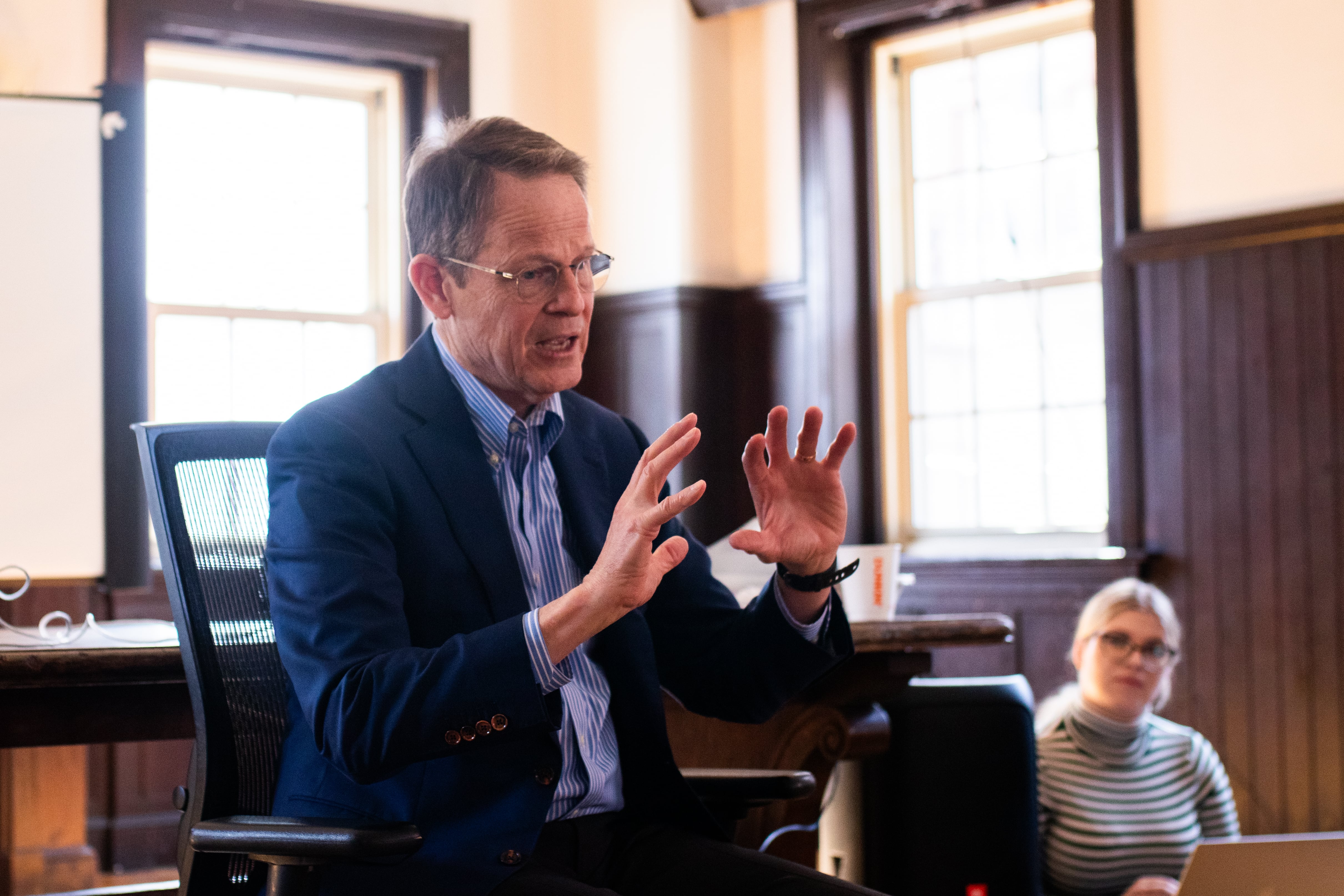After the turmoil of the last several months, do you think the Board of Overseers should step in to reassure donors? If so, how?
I don’t think the Board of Overseers should step in to reassure donors. I don’t think that’s the role of the Overseers. I think the roles are pretty well-established: Overseers are supposed to give feedback on the performance of the colleges and scholarship and that sort of thing. I think that they’re supposed to serve as advisors and voices of the community for the administration.
Do you think the current Board of Overseers election process is fair? Would you support lowering the write-in candidate signature threshold?
The process is inscrutable. I won’t say it’s unfair, but I was selected to stand for election completely without my breathing a word. I didn’t have any interest in running for election — I didn’t ask to be — so there was no interest on my part.
Having said that, now that I have been selected, I think that it’s probably fair, if you go back to the role of the Overseer: Their role really is to advise on program scholarship and the well-being of the institution, as opposed to being a single-issue candidate. I think once they’re asked to be on there, I think that having a bunch of write-ins who are more single-issue oriented would actually be a mistake, because I think the Overseer should oversee the core product of the institution, rather than being issue-oriented.
As a direct follow up, regarding the write-in candidates, there has been controversy over the increase in the threshold number of signatures required to get on the ballot. You mentioned the inscrutability of the process, would you support changing the threshold so as to make it kind of more democratically accessible?
I definitely would do that. I think if you’re going to have a write-in possibility at all, it should not be so inscrutable. It shouldn’t be so hard. I read that President Obama himself couldn’t figure out how to work the system when he wanted to be on the ballot. So I don’t think you should both have a write-in opportunity and make it completely impossible to do.
As Harvard now prepares to select Claudine Gay’s permanent successor, would you like to see any changes relative to the search process that selected Gay?
I don’t know the process very well. It’s another one of those things that seems to be within a relative black box. And so to comment on what those procedures were would be almost impossible. So maybe that question is the answer — maybe there needs to be more visibility, more transparency about the process. Maybe that by itself would be a first step.
Recently, Harvard has grappled with campus antisemitism, Islamophobia, and anti-Palestinian racism. In light of these issues, what is your perspective on the current state of campus culture?
I think that interim President Garber has done a good job with getting both of the task forces set up on Islamophobia and antisemitism. I think that’s a start.
I think there have also been some campus measures to have some conversations about this. The anonymous antisemitic posts were just alarming at every level. This conversation has started well by these two committees, and maybe by the council for people to talk to each other.
But Harvard as a community has to have a much larger conversation about what obligations we owe to each other as colleagues, what obligations we owe to each other as people, and what is tolerable in terms of content, and what is tolerable in terms of conduct.It’s a fairly good start, but the depth of the problem can hardly be overstated.
Do you support Harvard committing to institutional neutrality? In what areas should Harvard remain neutral?
Yes, I do support that. It is very tempting not to do that, because something happens and you want to react because you believe that is palpably wrong, or palpably good, perhaps.
But the important thing on the community here is that Harvard should be, as much as possible, common ground for all its colleagues. It shouldn’t have an official position on things so that other people feel like they don’t belong, they’re excluded. And I think a position of institutional neutrality actually frees students up, frees faculty up to have opinions, to take things without feeling that in doing so they’re excluded.
Very few institutions have been able to do that. I think the University of Chicago has done it well. People avoid it, because I think it’s hard to do. The second part of your question again, please?
In what areas should Harvard remain neutral?
There are two exceptions to the Kalven principles. I think actually, it’s a very tight area where you shouldn’t be neutral. And that will once again be extremely hard to do. But I think that those exceptions, if they could be followed, will set up students and faculty to feel like they can actually have viewpoint diversity on campus.
The University of Chicago, perhaps the most high-profile school to follow a policy of institutional neutrality, has cited that policy to reject calls from student activists to divest from certain financial interests, including in fossil fuels. Do you believe a policy of institutional neutrality should extend to investment decisions?
No, I think that things that happen internally, like fair labor practices, unions on campus, what our investments are — these are our decisions with each other about what we’re going to do. I don’t think institutional neutrality responds to that at all. Institutional neutrality should not protect you from that kind of thing.
How can Harvard respond to attacks against its credibility, or the credibility of higher education more broadly, if it is to be institutionally neutral?
I think having a view about institutional neutrality will permit Harvard to withstand those attacks more easily. I think one of the reasons Harvard is being attacked is the perception that it is not institutionally neutral, that it does not permit viewpoint diversity. And so that almost invites an attack, so I think institutional neutrality would help.
This isn’t exactly the question you asked, but I’ll follow up and say that I do think Harvard should fight the congressional subpoenas hard, because I don’t think that they’re valid subpoenas and I think that the interest of the government in the internal workings of Harvard is spurious. I actually think once again, institutional neutrality would permit Harvard to fight harder against those sorts of external attacks.
As I’m sure you know, Harvard will soon complete its first admissions cycle following the Supreme Court’s landmark decision curtailing the use of race in college admissions. As the University looks to maintain diversity at the College, do you support Harvard ending preferences for legacies and the children of donors?
I do think there’s some value in legacies; I think there’s no value, almost pernicious value, on the donor side. But let me answer this more broadly. The decision to end affirmative action made the case against legacy admissions much stronger.
But the broader question is, really, what kind of diversity do we want to have on campus. And do legacies play any role in that? Should there be any geographical preferences, so to speak? Should there be any preferences from people who can play music or art — or sports, I know that comes up a lot too? Should there be any kind of focus on admissions that definitely attack generational poverty? So I think that having a really, really, really well-rounded campus full of people that come on campus to create the student body probably should include some legacies.
So imagine if you have children, they will have been in your home thinking about what Harvard meant to you, they will have a sense of what Harvard was about, and that is a positive thing to bring to campus. So to exclude that like Wesleyan did, I think was a mistake, but it’s certainly understandable in light of that decision.
The past decade has seen a number of allegations of serious misconduct against tenured Harvard professors, ranging from repeated sexual harassment to falsification of data and other research misconduct. Still, to date, there are no known cases of Harvard revoking a professor’s tenure. In what cases, if any, do you believe revoking tenure is justified?
I would really have to know the facts of those cases pretty well. I look at this a little bit like I do as the head of the Museum of Science or the organizations that I’ve run. If a person in power has, depending on the facts, harassed another student, I don’t think tenure should protect someone from that. There is a little bit of a slippery slope, but tenure as a bar to that kind of misconduct should be a very, very low bar, as far as I’m concerned.
Do you support the creation of an Ethnic Studies department?
I would have great support for that. Having said that, the bars seem to be mainly financial and academic — they don’t seem to be about the quality of scholarship, or the importance of having an ethnic studies program. My own view about a college experience or university experience is that a variety of lived experiences on campus matters a lot. And that having an ethnic studies program would only help with that.
Can I just say one other thing?
Sure.
I am a co-resident of Cambridge: I run the Museum of Science. Half of the museum is in Cambridge. And we do have Harvard students on my campus quite a bit. And one of the reasons I’m interested in being an Overseer is that I think being a part of this community means helping the University make decisions about simple things like rising up to the environmental requirements of Building Energy Use Disclosure Ordinance and then more complicated things like how we relate to our neighbors.
Being on the ground in Cambridge with students is one of the reasons I’m interested in being an Overseer. You didn’t ask the question, but I thought I’d just throw it out there as one of the reasons that I’m interested. I love working with Harvard students. We have a number on campus all the time. And so being a part of that would mean a lot to me.



